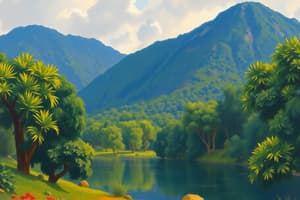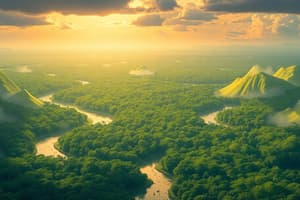Podcast
Questions and Answers
Which of the following animal species is commonly found in Colombia's tropical rainforests?
Which of the following animal species is commonly found in Colombia's tropical rainforests?
- Polar bears
- Camels
- Penguins
- Howler monkeys (correct)
Approximately what percentage of Colombia's territory is covered by tropical rainforests?
Approximately what percentage of Colombia's territory is covered by tropical rainforests?
- 75%
- 40%
- 25%
- 50% (correct)
Which of the following bird species is mentioned as inhabiting the desert zone of Colombia?
Which of the following bird species is mentioned as inhabiting the desert zone of Colombia?
- Andean condor
- Quetzal
- Scarlet macaw
- Black-bellied whistling duck (correct)
What is the primary reason cited for the importance of conserving Colombia's tropical rainforests?
What is the primary reason cited for the importance of conserving Colombia's tropical rainforests?
What was the primary outcome of Christopher Columbus' first voyage in 1492?
What was the primary outcome of Christopher Columbus' first voyage in 1492?
How many documented voyages did Christopher Columbus undertake across the Atlantic Ocean?
How many documented voyages did Christopher Columbus undertake across the Atlantic Ocean?
What impact did Columbus' voyages have on global trade, politics, and culture?
What impact did Columbus' voyages have on global trade, politics, and culture?
Who did Christopher Columbus report his findings to after his first voyage?
Who did Christopher Columbus report his findings to after his first voyage?
What is considered a turning point in human history according to the text?
What is considered a turning point in human history according to the text?
Flashcards
Sabana Region
Sabana Region
Grasslands in northwestern Colombia, characterized by rolling hills, grasses, and scattered trees. Important agricultural area.
Desert Zone of Colombia
Desert Zone of Colombia
Arid region in northwestern Colombia (Guajira). Low precipitation and high temperatures are common.
Tropical Rainforest
Tropical Rainforest
Extensive forests in Colombia, covering a large portion of the country. Known for high biodiversity and carbon sequestration.
Wildlife in Sabana
Wildlife in Sabana
Signup and view all the flashcards
Wildlife in Desert Zone
Wildlife in Desert Zone
Signup and view all the flashcards
Wildlife in Tropical Rainforest
Wildlife in Tropical Rainforest
Signup and view all the flashcards
Agricultural Importance of Sabana
Agricultural Importance of Sabana
Signup and view all the flashcards
Conservation Efforts
Conservation Efforts
Signup and view all the flashcards
Global Biodiversity
Global Biodiversity
Signup and view all the flashcards
Study Notes
Regiones Naturales de Colombia
Colombia is a country known for its diverse landscapes and ecosystems. It has various regions with distinct characteristics, including the Sabana region, the Desert zone, and the Tropical Rainforest. In this piece, we'll explore these three regions, discussing their features, wildlife, and cultural significance within Colombia.
Sabana Region
The Sabana region of Colombia refers to the grasslands found mainly in the northwestern part of the country. This vast area consists of rolling hills covered with grasses and small shrubs, punctuated by scattered trees such as the Palma Real. The Sabana is considered one of the most important agricultural zones in Colombia, contributing significantly to the national food production.
Wildlife in Sabana
Some species commonly found in the Sabana region include deer, jaguars, tucans, and various rodents. Reptiles like iguanas and snakes also inhabit the region. However, habitat destruction due to agriculture and human population growth threatens many species in the Sabana, making conservation efforts crucial.
Desert Zone
While not traditionally seen as a desert, certain areas of Colombia, specifically the northwestern department of Guajira, have desert-like conditions. The desert zone is characterized by a lack of precipitation during much of the year, with temperatures often exceeding 30°C (86°F). Despite these harsh conditions, this region has been inhabited for thousands of years, with communities like Riohacha and the Wayúu people living in the area.
Wildlife in Desert Zone
Despite the arid climate in the desert zone, wildlife still thrives here. Some species found in this region include various types of lizards, snakes, and rodents. Bird species like the black-bellied whistling duck also inhabit the area. The desert zone is home to unique plants such as xerophytic succulent shrubs.
Tropical Rainforest
Colombia has one of the largest areas of tropical rainforests in the world, with approximately 50% of its territory covered by forest. These forests are divided into different types based on altitude and climate. They are crucial for maintaining global ecological balance due to their high rates of carbon sequestration and biodiversity.
Wildlife in Tropical Rainforest
The tropical rainforests of Colombia are home to numerous plant and animal species. Some notable ones include over 1,000 bird species, around 550 mammals, and thousands of insects, reptiles, and amphibians. The region's diverse ecosystems support significant populations of jaguars, tapirs, sloths, and howler monkeys.
In conclusion, Colombia's natural regions exhibit a wide range of landscapes and ecosystems. Each area provides unique habitats for various flora and fauna, contributing significantly to our understanding of global biodiversity. As these environments continue to face threats from human activities, it is essential to promote conservation efforts and sustainable practices for their preservation.
Studying That Suits You
Use AI to generate personalized quizzes and flashcards to suit your learning preferences.




